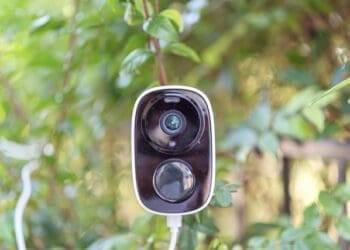In today’s fast-paced business environment, ensuring the security of your premises is more important than ever. Electronic door locks have become a cornerstone of commercial security, blending convenience with advanced access control features.
These locks offer businesses a level of security that traditional mechanical locks cannot match, allowing for keyless entry, the ability to track who enters or leaves a building, and even the integration with broader security systems.
Choosing the right electronic door lock for your business is not just about enhancing security; it’s about embracing efficiency and modern technology to protect your assets and provide peace of mind.
This article will explore the various types of electronic door locks available, including keypad doors, keyless entry systems, and those equipped with access control capabilities.
We will delve into the key criteria you should consider when selecting commercial electronic locks, from the material like satin chrome to the type of access control offered. Additionally, detailed comparisons of top electronic door locks on the market, including those offered by leading manufacturers like Schlage, will provide valuable insights.
By understanding the different features and benefits of electronic locks, electric strikes, and commercial door hardware, decision-makers can equip their business with the best security solutions tailored to their specific needs.
Understanding the Different Types of Electronic Door Locks

A keyless entry system is an electronic lock that controls access to a building or specific areas without traditional mechanical keys. Instead, it relies on various authentication methods, such as:
Keypad entry systems
Electronic keypad locks require users to enter a unique numeric code to gain access. They offer a simple and cost-effective way to secure doors but sharing codes may lead to security breaches.
Keypads are often combined with other access control systems like card readers for multi-factor authentication.
Biometric locks
These locks use unique physical features like fingerprints or iris scans for authentication, offering high security. Biometrics are frequently used alongside other entry methods for enhanced access control.
Card access systems
Smart card systems require users to present a card or key fob to a reader. While more secure than codes, managing physical tokens can be cumbersome and expensive. Card readers are commonly integrated with other systems like keypads.
If you enjoy the reading!!! I have other content related to this article. Click here
Remote access systems
Smartphone-based access leverages mobile apps to facilitate entry, eliminating physical tokens. However, some employees may be hesitant to use personal devices for work access. This technology enables convenient, secure access control management.
Other common electronic door lock components include electric strikes, magnetic locks (maglocks), electrified mortise locks, cylindrical locksets, and exit devices integrated with access control systems. The choice depends on factors like security needs, door types, aesthetics, and budget.
Key Criteria for Choosing Electronic Door Locks

Durability and Reliability
Commercial doors, subjected to intense usage, require a lock system that can withstand the test of time and usage. The door lock, serving as the core of door security, must be chosen with precision, ensuring it meets the commercial standards for durability and security.
The use of high-quality locks, supported by sturdy door frames and metal constructions, ensures the entire assembly works seamlessly to protect against unauthorized entry.
For outdoor or high-traffic areas, choose locks built to withstand various environmental conditions and physical wear. Look for locks with suitable IP (Ingress Protection) ratings.
According to the Builders Hardware Manufacturers Association (BHMA), a grade one lock offers advanced strength to protect commercial buildings. They can resist 360 lbs in weight, ten strikes and 800,000 cycles, making them ideal for areas with medium to high traffic levels.
Want to learn more… Click Here
Technology Compatibility
The fusion of technology with traditional commercial locks marks a significant leap towards enhancing security measures. Smart commercial door locks, embodying the latest in security technology, offer features such as remote access, biometric identification, and real-time monitoring, setting new standards for commercial security.
Assess the installation process and hardware compatibility. Ensure that the lock can be easily installed on your existing doors without requiring major modifications.
The biggest mistake you could make is getting a smart lock incompatible with everyone’s software. Buying a smart lock that’s only compatible with Apple software will hinder those who need access to the building and don’t own an Apple device. It’s important to keep all your technology in one accord to eliminate future problems.
Scalability for Business Growth
Scalability – Future Needs of the Business: Consider your business’s growth trajectory when selecting a lock system: • Modular Systems: Opt for electronic locks with the ability to add new users or access points as your business expands.
• Scalable Cloud-Based Access Control: Cloud-based systems allow for easy addition of new locations or users to your security network. Choosing a scalable system can save you money and hassle in the long run as your business grows.
We pick smart locks which can integrate into or eventually become larger systems as your business grows.
Installation and Maintenance Requirements
Establish a maintenance plan to keep the smart door lock system in optimal condition. Regularly update firmware and software to address vulnerabilities and improve performance.
Maintenance Requirements for Different Lock Types: While some locks are virtually maintenance-free, others require regular attention: • Mechanical Locks: Periodic lubrication and key replacement might be necessary.
• Electronic Locks: Battery changes and occasional software updates may be needed. • Biometric Locks: Regular cleaning of fingerprint scanners might be required to ensure optimal performance.
Understanding the maintenance requirements of different lock types will help you factor in ongoing costs and ensure your system functions smoothly over time.
Adopting a proactive approach to maintenance can significantly enhance the longevity and effectiveness of commercial door locks equipped with new age access technology.
Scheduled check-ups by professional security specialists can identify potential issues before they escalate, ensuring locks perform optimally and safeguard against unauthorized access.
Detailed Comparisons of Top Electronic Door Locks

The three major brands of locks are Schlage, Kwikset, and Yale, each with its advantages and disadvantages.
Alarm Lock vs. Schlage
Schlage locks are made from high-quality materials that resist brute force attacks better than Kwikset locks. They offer a wide variety of styles and designs, making them a popular choice for homeowners.
Schlage’s August Smart Locks have been well-received, with users praising features like remote connectivity, automatic locking, and seamless integration with platforms like Airbnb.
Kwikset vs. Yale
While Kwikset locks are known for their affordability and diverse designs, they are made from weaker metals and may be more susceptible to break-ins.
Yale locks, on the other hand, are renowned for their high-quality materials and resistance to brute force attacks, although some critics find their lock designs lacking in diversity.
August vs. Lockly
August Smart Locks stand out for their compatibility with various smart home platforms, including Alexa, Google Home, and Apple HomeKit (except for the Connect model).
They offer features like virtual key sharing, activity logs, and auto-unlock/lock functionality.
Lockly, another prominent brand, impresses with its concealed mechanism and innovative features like shifting touchscreen keypads and fingerprint recognition for enhanced security.
Both August and Lockly offer robust battery life, with August’s rechargeable lithium battery and Lockly’s backup battery option. While Lockly may be pricier, it provides a range of finishes to match existing fixtures.
Conclusion and Final Thoughts
Through the course of this exploration into the varied realm of electronic door locks, we have navigated through the key aspects that shape their suitability for commercial use, covering the spectrum from basic keypad entry systems to advanced biometric and remote access solutions.
Emphasizing the critical considerations of durability, technology compatibility, scalability, and maintenance requirements, this article has laid a comprehensive foundation to assist businesses in making informed decisions.
The journey towards selecting the ideal electronic lock is not just about security; it’s about aligning with technological advancements to foster an environment that is both secure and adaptable to the evolving landscape of commercial needs.
Reflecting on our discussion, it becomes evident that the choice of an electronic door lock system should be informed by a nuanced understanding of one’s specific security requirements, future growth projections, and the technological ecosystem of their business.
With the insights drawn from comparing top industry brands like Schlage, Kwikset, and Yale, and considering the practical aspects of implementation and maintenance, businesses are better equipped to navigate the complexities of modern security challenges.
By prioritizing a system that integrates seamlessly into their operations, companies can not only enhance their physical security but also position themselves at the forefront of innovation in commercial security solutions.
Thank you!!! For making it down this far in my article. If you are enjoying this article. I have many more articles to talk about on this subject. Learn more here.
FAQs
What factors should be considered when selecting an electronic door lock?
When choosing an electronic door lock, it’s essential to consider several factors to ensure optimal security and convenience. Key aspects include the lock’s security features, which enhance your safety and prevent lockouts. Additionally, check if the lock is compatible with your current door setup, ensure that the installation process is manageable, and confirm that the lock’s operation is user-friendly.
Which smart lock is recommended for commercial purposes?
The Schlage NDE Wireless RFID Card Lock is highly recommended for commercial use. It integrates a lock, credential reader, door sensor, and request-to-exit switch into one unit, making it not only straightforward to install but also simple to use, catering well to the needs of business owners.
What are the critical elements to consider in a digital lock?
When choosing a digital lock, especially for a home’s main door or gate, important aspects include the overall quality of the lock and its compatibility with your door or gate. Consider the preferred methods of access, the ability to set up user profiles, and the lock’s style and design to ensure it matches your home’s aesthetics.
Do commercial door locks differ from residential locks?
Yes, commercial door locks differ significantly from residential locks. They are generally more robust and durable. According to the Builders Hardware Manufacturers Association (BHMA), commercial buildings benefit from using grade one locks, which are designed to offer enhanced strength and security compared to typical residential locks.

















